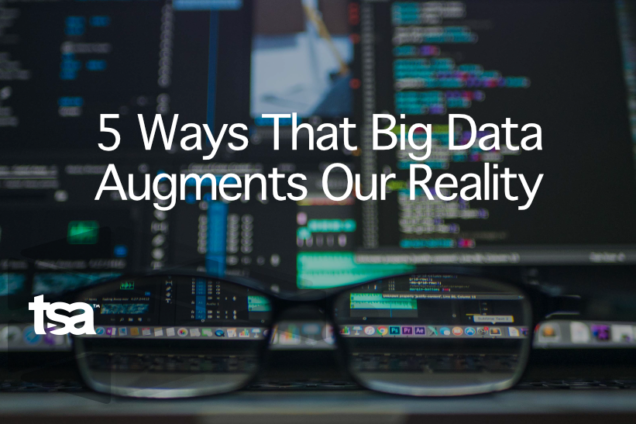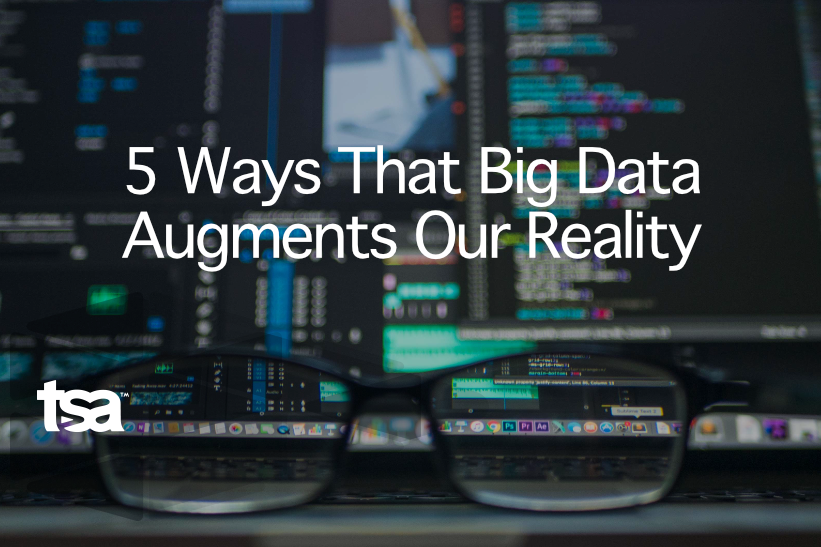We live in the Digital Age. An age where you can’t do a quick Google search for “cheap flights to Utah” without ads for Kayak.com or Zion National Park popping up in the margins of your web browser for the next two months. And while retargeted ad campaigns can pose as mild annoyances, the insights available to us through Big Data analytics can do vastly more to improve our lives than it can to hinder them.
The Exponential Archive
Big Data gathers, deciphers, and leverages a huge amounts of end-user information on a daily basis. In fact, (ever since 2003) we create and record “as much information as we did from the beginning of time” in just two days. By 2020, analysts predict that the amount of collected data will be fifty times that of what it is today. And those numbers will just continue to grow.
So, in light of this growing reality, we want to discuss some of the primary roles that Big Data plays in both corporate and private sectors.
Mobile Applications
How often do you use your phone’s GPS in a week? Most likely the answer is “quite often.” In order to provide the most accurate map data available, GPS apps and other location-dependent technologies—like Google Maps, MapQuest, and Waze—can leverage Big Data’s ability to access years’ worth of maps and geographical information. In turn, Big Data gathers and synthesizes the real-time reports generated by GPS applications in order to monitor traffic patterns, improve traffic light sequences, and direct drivers more efficiently (among many other uses). Not only does this data inform construction companies on the average wear and tear of a particular roadway, it also can save lives as emergency response teams are able to direct their vehicles with increasing speed and safety.
E-commerce
Staying one step ahead of today’s demanding breed of consumer—the omni-channel shopper—is no easy task. Because of the sheer amount of websites and online vendors available to them, consumers are more likely to, quite literally, “shop around” from site to site. More than ever, it is important for online companies to stand out in the crowd. In order to better cater to their consumer-base, retailers use Big Data analytics to collect and synthesize real-time search data to make educated predictions about future trends and product demands. This predictive tool not only keeps you prepared for the future, it also cuts down on waste at the manufacturing level as vendors are able to predict how much of a particular product they will need at a given time.
Marketing and Advertising
The analytics and algorithms of Big Data are also what produce personalized ads (like the “Kayak.com” and “Zion National Park” ads you experienced after that Google search earlier). In short, Big Data maximizes advertising efficiency by creating and presenting targeted ads to the most relevant audience, thus saving money on production and simultaneously increasing manufacturer revenue. And as annoying as some ads can be for the consumer, a great majority of the advertisements actually find their mark, ultimately granting a more streamlined and pertinent consumer experience.
Music and TV Streaming
If you use any kind of streaming site, whether it be music or video, Big Data tracks what artists you listen to most and what film and TV show genres you prefer. From this aggregate data, companies like iTunes, Spotify, Netflix, and Hulu will continually suggest new songs and movies for you to consume—with a goal of keeping consumers contented and coming back for more. However, this is not a one-way street. For instance,Netflix and other multimedia giants use the analyzed, aggregate data from millions of their subscribers to then produce entirely new movies, tv shows, and albums that are “custom-fit” to current demands and preferences. And the customization cycle continues.
Online Banking
When it comes to online banking, Big Data’s main role has been to simplify tasks while increasing security. Big Data’s capacity to track and analyze aggregate data provides banks with more accurate reports of their clients’ spending habits and income rates, which allows the bank to more accurately meet client demand for resources. Most importantly, because banks have been entrusted with massive amounts of customers’ sensitive data and funds, security is of the utmost importance. As such, Big Data’s algorithms can be leveraged to provide increased fraud detection and prevention as well as enhanced compliance reporting for a more secure and efficient end-user experience.
Big Data: More Than Knowledge
It goes without saying that the five categories listed above fall hopelessly short of an exhaustive list, because the reality is that Big Data impacts the everyday lives of billions of people. As it is, a complete litany of Big Data’s effects and benefits would be practically unending, so we decided to only highlight some of the most prevalent forms to get started.
Why talk about Big Data at all? Well, at TSA, we believe that the better we know you, the better we can serve and partner with you. And Big Data is a big way that we do that. In turn, the more completely you understand the technology behind our services, the better you can recognize our dedication to you as a client.
When we next revisit this topic, we will continue the Big Data Discussion by focusing, not only on the technology’s ability to augment our reality, but also on how it can profoundly increase our quality of life. We look forward to seeing you there.

